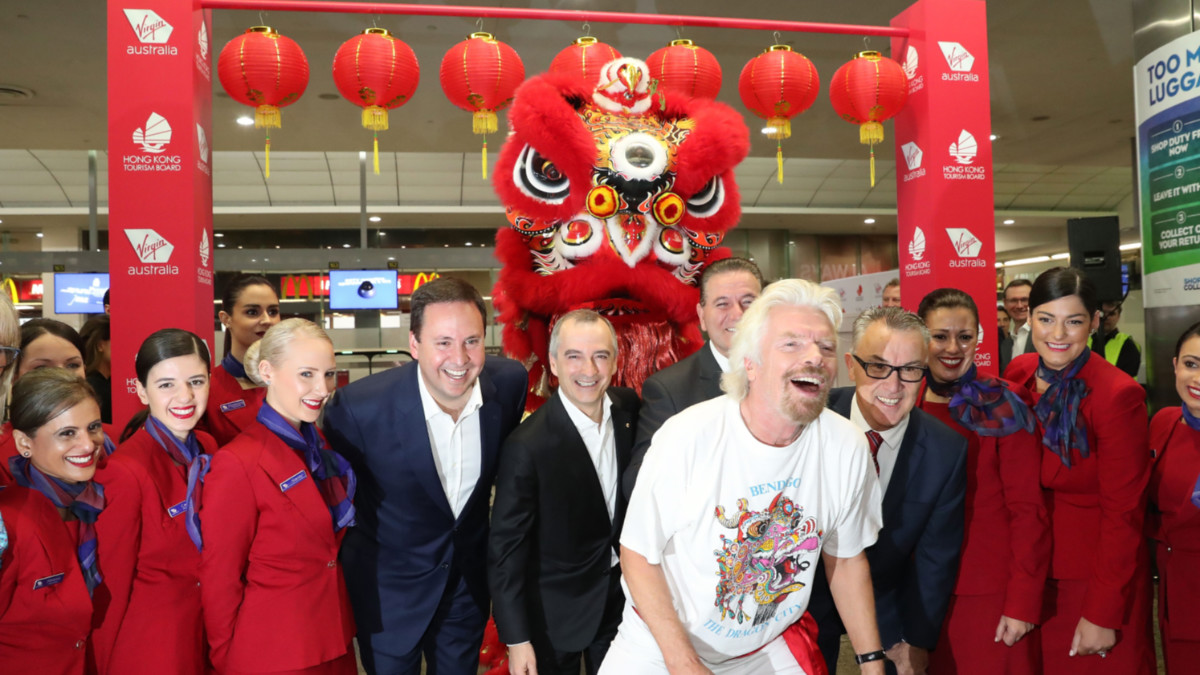Virgin Australia: What fate awaits and what will it mean for Velocity points holders & Australian aviation?

Virgin Australia has seen happier times like in 2017 when it launched flights to Hong Kong (Picture: Getty)
Virgin Australia (ASX:VAH) appears to be in a fight for survival right now and it doesn’t look like it’s going well.
No passenger airline is going well right now with little air travel besides government-funded repatriation flights, but Virgin had racked up several years of losses as well as $5bn in debt — a figure dwarfing it’s $727m market capitalisation.
The Morrison government has to date denied it the same helping hand it gave smaller regional airlines like Regional Express (ASX:REX). Virgin is currently suspended from trading while it assesses its options.
Many people are panicking right now including points holders, would-be passengers and retail shareholders. Some of them would remember the collapse of Ansett Australia in 2001.
Back then anyone with a vested interest in Ansett from ticket holder to shareholder lost everything to do with the airline. Will this happen all over again?
Stockhead spoke with industry expert Steve Hui, the founder of iFLYflat, a consultancy which helps people manage their frequent flyer points. He says if Virgin did go under, the outcome would be different from 2001.
What’s your gut feel on Virgin Australia’s situation?
“The latest news is their current shareholders aren’t willing to give more of their own money. That doesn’t mean they don’t care about the [Australian] market.
“There is a lot of trading and negotiations going on behind the scenes to get a deal.
“I think it [Virgin] will exist in some form but probably not in the current form. No company will put money in now when they could later [post-administration].
“It’s easier to turn on Virgin Australia’s assets than start a brand new company from scratch.”
What about Velocity? Could that see a 2001 moment where people lost all their points?
“I think with frequent flyer points it will be different because back then the airlines and frequent flyer programs were the same business.
“But nowdays Virgin and Velocity are run as separate businesses. The corporate structure [between the two] is separate, it’s just that Virgin owns Velocity as a company.
“If you think back before COVID-19, Virgin Australia purchased back its share of Velocity from Affinity Equity Partners – lucky for them.
“They valued it at over $2 billion. So frequent flyer programs nowadays are all about marketing than a frequent flyer.
“At the last count Velocity had 10 million members and Qantas had 13 million so it had tremendous marketing value.”
So Velocity points holders can relax? They’ll still be around even if the airline isn’t?
“For people who have points there’s a lot of loyalty and customer connection – it’s worth more than the airline.
“So someone will buy it and run it as a loyalty business but the only time it has happened in the past is in Canada. AeroPlan was spun off by Air Canada but they only recently repurchased.
“This didn’t work out well but it doesn’t mean it can’t.”
Would Virgin’s replacement necessarily be a new airline or perhaps another loyalty brand program?
“If you’re thinking about a new airline entrant they need customers so they can launch their own program and build from scratch or buy an existing customer base and entice customers to fly on them.
“It all comes down to the value of either proposition.
“I believe the Velocity program will still have a life outside of Virgin Australia should it go under.
“If you have Velocity points they still allow you to redeem for something because it’s been paid for already.”
If a new airline was to replace Virgin Australia, what should it learn from Virgin’s mistakes? Inevitably a collapse would mean Borghetti’s shift to make it a second Qantas ultimately failed?
“Just stick with what is profitable.”
“Virgin weren’t in a global alliance but had bilateral agreements with Etihad, Delta and Singapore Airlines.
“I think they were trying to replicate an international network in an economy not big enough.
“I’d expect a future player to be just domestic, because domestic travel is highly profitable. For example Sydney to Melbourne traffic is one of the highest in the world.
“So they’ll most likely stick to what is profitable rather than trying to be an international player.”
UNLOCK INSIGHTS
Discover the untold stories of emerging ASX stocks.
Daily news and expert analysis, it's free to subscribe.
By proceeding, you confirm you understand that we handle personal information in accordance with our Privacy Policy.








